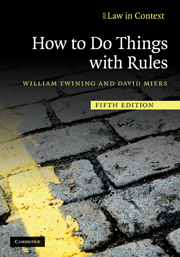Book contents
- Frontmatter
- Contents
- Preface
- Online appendices
- Acknowledgements
- Abbreviations
- Table of statutes and legislative instruments
- Table of cases
- Part I
- Part II Reading, using and interpreting rules in general
- Part III Reading law: reading, using and interpreting legislation and cases
- 6 Routine and problematic readings
- 7 Legislation
- 8 Interpreting legislation
- 9 Reading cases
- 10 The European dimension
- 11 Rules, reasoning and interpretation
- Part IV
- Index
- Resources on the web
- References
11 - Rules, reasoning and interpretation
Published online by Cambridge University Press: 05 June 2012
- Frontmatter
- Contents
- Preface
- Online appendices
- Acknowledgements
- Abbreviations
- Table of statutes and legislative instruments
- Table of cases
- Part I
- Part II Reading, using and interpreting rules in general
- Part III Reading law: reading, using and interpreting legislation and cases
- 6 Routine and problematic readings
- 7 Legislation
- 8 Interpreting legislation
- 9 Reading cases
- 10 The European dimension
- 11 Rules, reasoning and interpretation
- Part IV
- Index
- Resources on the web
- References
Summary
The subtitle of this book is ‘a primer of interpretation’. We have now reached a stage where a puzzled interpreter, if she has learned the lessons of earlier chapters, should be in a position to diagnose the source(s) of her doubt and to identify how potentially sound arguments for resolving them may be constructed, at least in any reasonably straightforward case. The purpose of this concluding chapter is to take the puzzled interpreter a stage further; to consider in greater detail the nature of reasoning in legal contexts and of its relationship with interpretation. The final section addresses the question whether it is possible to develop a general theory of legal interpretation.
From diagnosis to argument
Diagnosing problems and tackling them are not identical operations. Sometimes, once the nature of a problem has been settled, the solution is straightforward or even self-evident. Sometimes a solution may be arrived at without much understanding on the part of the person(s) involved. Sometimes a problem, once understood, is seen to be insoluble. But more often a solution can be achieved only after a good deal of hard graft.
All these possibilities occur in the contexts of interpretation. Some problems of interpretation, once diagnosed, need no elaborate apparatus of analysis and reasoning for their resolution. It is small comfort to an official who has to administer a silly rule to recognise clearly that he has been presented with an acute dilemma because someone earlier in the process has made an error or because of some feature of the system that he is not in a position to alter or avoid; the dilemma remains and may not be easily resolved.
- Type
- Chapter
- Information
- How to Do Things with Rules , pp. 336 - 376Publisher: Cambridge University PressPrint publication year: 2010



